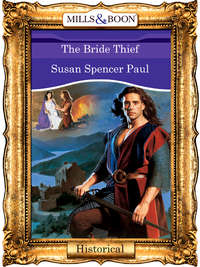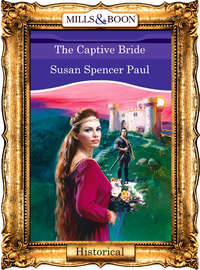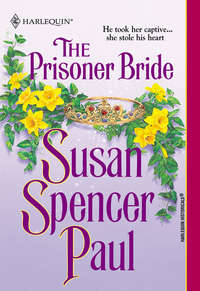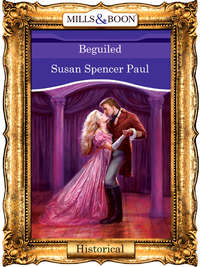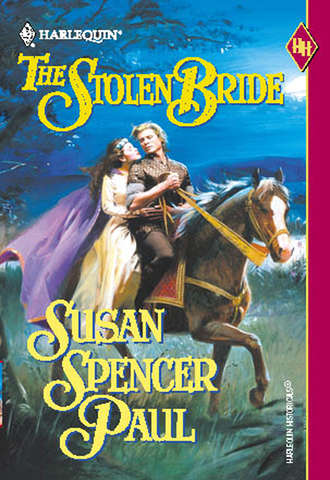
Полная версия
The Stolen Bride
It didn’t take long. A few more strokes with the great hammer and he was done. Straightening, Kayne lifted a partly formed ax-head from the anvil with a pair of tongs, examined it, then carefully placed it in a nearby tub of water. The water sizzled and steamed, and then fell still. Kayne put the tongs and his hammer aside and, without looking at Sofia, walked to a worktable nearby where another basin sat. Dipping his fingers in, he scooped up several handfuls of water and splashed his hair, face and neck, shaking his head until water flew in every direction and coursed in small rivers down his chest. He took up a towel and dried himself. Then, at last, he turned to Sofia.
“Mistress,” he greeted in his usual solemn manner.
“Master Kayne.” Sofia gave a slight nod in turn. “I hope I do not disturb you in too important a matter? I meant only to render my thanks for the kindness you showed me some days past.”
He glanced at the basket on her arm.
“There is no need, just as I told you.”
She smiled. “I realize you desire no measure of gratitude, but I wish to thank you even in this small way.” She walked to the table and set the basket upon it, pulling away the cloth that covered the goods inside. “You see? ’Tis only a few sweet cakes and some tarts with pears and apples that our cook made yesterday. Nothing more sinister, I vow.”
“And this?” He tapped one long finger against the lid of a small pewter jar. Another similarly lidded jar sat beside it.
“Almond cream,” she said, distracted by the sight of his hand. “And currant jelly.” Those same strong fingers had touched her bare flesh, and so carefully soothed her pain. But on that day she’d been too mired in her own misery to care that his wounds were not yet fully healed. Now, she could plainly see that the burn scars were cracked and reddened from such harsh work.
“Kayne,” she murmured, reaching out to take his hand when he would have pulled it away. “You shouldn’t be laboring in this harsh manner so soon. Look at your hands. Merciful God.” She bent to take his other hand and lifted it up to examine. “Oh, Kayne,” she said unhappily. “’Tis bleeding here.” She gently touched one of the severest scars. “’Twill never heal properly if you do not take greater care.” Still holding his hands, she looked up at him, but the rest of the tirade set upon her lips died away.
She hadn’t realized how closely they stood together. So close that their bodies were almost touching. His face was but inches from her own, and his blue eyes were gazing down at her in a manner that made her heart leap within her chest. She had seen that look before on the faces of other men, most especially on Sir Griel’s, but never before had it produced such an effect on her. Instead of disgust, Sofia felt something altogether different, and far more alarming. Flustered, she released his hands and stepped away.
“Forgive me,” she murmured, busying herself with covering the basket once more. “’Tis none of my concern, though I dislike seeing my handiwork gone to naught.”
“As do I,” he said. “You seem much improved today. Your wounds are healing?”
“Yes, thank you, Master Kayne. Very much so. But I have not continued to neglect my wounds as you have done. You chided me for such only a week past.”
Kayne looked at his hands, flexing and unflexing the fingers. Then he gave a shake of his head and moved back toward the tub where he’d left his work cooling. “I do not have the luxury of being able to coddle myself,” he told her, using his tongs to fish the ax-head from the water, “nor have I ever done so. The scars will be with me all of my life, and both they and I must learn to live with this manner of labor.”
“You have many scars,” she murmured, watching him thoughtfully. She had seen the number of the wounds he bore while she’d cared for him. “Were you ever a soldier, Master Kayne?”
He glanced at her over his shoulder. “Aye, I was once. I fought in France for a time.”
Ah, Sofia thought with satisfaction. A small part of the mystery unfolded. He had been a soldier, and bore a soldier’s scars. But he must have seen many a battle indeed to be so heavily marked.
“Is that how you come to have Tristan?” she asked, then wished she hadn’t. He was a solitary man, and would not want to be plagued with such questions. Kayne the Unknown had made it clear since he’d come to Wirth that he valued his privacy above all else.
But he replied readily enough. “Tristan was given to me as a gift by a very great man…a knight of the realm.”
Sofia was astonished. “’Tis a fine gift, indeed. Did you save his life during battle?”
He was standing to the side, turned nearly away from her, but Sofia thought that she could see a slight smile on his lips.
“Nay, he saved mine.” He glanced at her again before lifting the ax-head higher into the firelight to examine it more closely. “The pot I mended for you has not cracked again?” He clearly wished to speak of himself no more.
“Your mending has held,” she said, “and will, I think, until the pot can no longer be used. ’Tis better than new, I vow.”
He uttered a laugh. “Nay, that it is not. I am not so skilled a blacksmith.”
“You are the finest blacksmith in all of Sussex,” she said chidingly, “and well you know it.”
Now he smiled—truly smiled—at her, looking so handsome and beguiling that Sofia found it necessary to draw in a deep breath.
“If you insist, Mistress Sofia,” he said. “’Twould be useless to argue with you o’er the matter, even at the risk of embracing false pride, for I’ve well learned that you will have your own way or none at all.”
Sofia smiled, too. “I have learned much the same of you, Master Kayne. But you’ve naught to fear in the matter of false pride. I have not overstated the matter of your excellence.”
He had returned to the working table and laid the ax-head upon it, beside an array of smithing tools. “You are very kind,” he said. “I shall pray to meet all your expectations.”
“Not mine, nay,” she replied at once. “You already labor far too long and hard.” She took a few steps about the large, airy building, admiring its cleanliness and purity of form. How different it was from what such places usually were—dark, foul-smelling and filthy. But both this building and Kayne the Unknown’s dwelling were open, spacious and inviting, always clean and in perfect order. “You are ever here in your smithy. Do you never have a day for rest and pleasure?”
“I need none.”
She turned to watch as he deftly prepared the ax-head for further work.
“You have lived in Wirth for fully a year now, yet you have never attended any of the fairs or celebrations. Tomorrow is Midsummer Day, and there will be much to do.” She took a step toward him, suddenly bold. “Come to the feast tomorrow and be merry for a few hours. Will you?”
Intent upon his work, he gave a shake of his head. “Nay, I’ve too much to do.”
“But you’ll have no custom brought to your door tomorrow,” she said persistently. “All the villagers will be there, dancing and feasting. ’Twill be a fine and pleasant day, I vow.”
“And you will dance around every bonfire once darkness falls, no doubt,” he said, still turned away.
The words—and what they implied—made Sofia blush hotly. A young woman seeking a husband would be married within a year if she but danced around seven bonfires on a Midsummer Night, or so it was believed. Sofia had ever scorned such tales, but Kayne’s speaking of it seemed to reveal some unspoken truth hidden away in her heart—one that she could not admit, even to herself.
“Nay,” she said firmly, pushing such foolishness aside. “I have no desire to wed.”
He put his work down and turned to look at her, surprise written on his handsome face.
“Never?”
She shook her head. “My father has too much need of me, as do the people of Wirth.”
His expression darkened. “You are unjustly burdened, Mistress Sofia. A woman such as you should wed and seek her own happiness.”
“It is not so easy a thing, Master Kayne,” she said with a weary smile. “But I am happy as I am. And content, in my own way.”
He was clearly dissatisfied by her answer. “What of Sir Griel?” he asked. “He has made it known to one and all that he will have you for a wife before the year has gone.”
Sofia tensed with anger. “I will never be wedded to such a man,” she vowed. “No matter what he may do to me, or how he may strive to terrify my father.”
Kayne drew nearer, searching her eyes.
“He’s the one who did this to you, is he not?” He lightly touched her shoulder, where her flesh had been scratched.
Sofia moved away, unable to tell him the truth of what had happened. No one outside of Ahlgren Manor knew the fullness of her shame, for her servants had remained loyal in saying little. But she knew that rumors were being whispered among the villagers, and feared that it would not be long before everyone knew Sir Griel had given her such grave insult. And once the truth was known, the citizens of Wirth would fear him even more than they already did. Sofia would have no one to turn to for help and protection.
“I have kept you from your work for too long, Master Kayne. Forgive me.”
“Sofia.” His hand curled around her arm, gently, holding her still. “I give you my word of honor that you can trust me, even if you can trust no one else. If Sir Griel has threatened you—”
“I’m not afraid of Sir Griel,” Sofia told him tautly, “or of any man.”
“You should be,” Kayne said. “He is a man of great cruelty, and therefore a man to fear. If he dares to set a hand to you again, come to me and I will deal with him, for your father will never do so.”
Sofia pulled free. “You are kind, Master Kayne, but I would not ask that of you. ’Tis too much, and you owe me naught.”
“For all you did for me after the fire,” he said, “I can never fully repay you. But it is not for that alone. I will not stand aside and watch any man bring harm to a woman. I have sworn before God that I would always defend—” He fell suddenly silent. “Only tell me if he should trouble you, mistress. Promise me that.”
Sofia touched her arm over the place where his fingers had curled, holding her in so careful a grasp. How strange he was! Had he sworn, as a knight did, to protect and defend women? But he had been a mere soldier. He’d just told her so.
“I will give you my promise,” she said slowly, “if you will promise to attend the Midsummer Day feast. And to dance with me.”
“I do not make merry,” he told her stonily.
Sofia gave a curt nod. “Then I will likewise make no promises. Good day to you, Master Kayne.”
“Good day,” he murmured, adding, before she could leave, “I will return the basket to you on the morrow.”
“I will be busy on the morrow. Dancing and feasting and having a fine day. And you will be here alone, as ever.”
He made a sound of aggravation. “Then I will return it the day following.”
“As it pleases you, Master Kayne,” she said, and turned to walk away.
Chapter Four
It was nearly midnight when Kayne rode out of Wirth, cloaked in a heavy black cape and riding atop Tristan. He knew that the destrier’s heavy hooves made a great deal of noise, but the pleasure he experienced at riding his magnificent steed far overtook his fear of unsettling the villagers.
A powerful mount, Tristan readily bore Kayne’s muscled weight, moving with a speed and grace that made it seem as if he carried nothing at all. Once clear of the village, he gave the horse full rein, bending low over the animal’s neck as it lengthened its strides, galloping for several long minutes with clear enjoyment.
When they neared the forest, Kayne at last reined the majestic beast in, slowing his pace by degrees. Just as he had been during their years together in France, Tristan was instantly obedient to his master’s will. Without such obedience, Kayne knew, he’d have been long dead. More times than he could recall it had been Tristan’s perfectly honed skills as a warhorse that had kept them both alive.
It was an easy matter to find the place where he needed to turn in, though it was not always so in the midst of those nights when he journeyed to the forest. Tonight, however, the moon was nearly full, giving plenty of light for such late wanderings. Tomorrow night, Kayne thought, glancing upward, ’twould be even brighter, and all those celebrating Midsummer Night would rejoice to have their dancing and feasting made that much more pleasant.
Sofia, especially, would enjoy herself. She had a gift for happiness; one that he envied greatly. He could almost envision her now, with her long golden hair unbound and flowing free, crowned with a circlet of flowers and swaying like the finest silk cloth as she danced about the bonfires. She’d have no lack of partners. Nay, she’d suffer quite a different trouble by having far too many vying for her hand, both young and old alike.
It wasn’t far to the clearing which was his destination. Senet and John were there before him, waiting.
“Where is Aric?” Kayne asked as he brought Tristan to a halt. He dismounted with ease as the other men approached, and held out a hand in greeting.
“His wife, Magan, is heavy with child,” Senet Gaillard, the lord of Lomas, replied, clasping Kayne’s arm in the manner of long friendship, “and he will not leave her for fear that the babe might come with him gone. ’Tis good to see you again, Kayne. You are well?”
“Most well, as you see,” he assured him before turning to greet the other man. “John, well met.”
John Baldwin, who had recently become the lord of Cap-well, shook his hand warmly.
“Aye, indeed, Kayne. I was sorry not to come when Senet and Aric last met you here, and so had to come this time. Clarise sends her warmest love.”
“Give her my thanks, and send my own affections in return. She is well and happy? But I think she must be, now that you are wed.”
John smiled and nodded. “Most happy, we are, the both of us. But what of you? Your burns are much healed from what I saw many months ago.”
“He has the lady of Wirth to thank for it,” Senet said, grinning at Kayne. “A very beautiful lady, from what is told of her, and most attentive to our Kayne. Mistress Sofia Ahlgren is her name, but to hear the words fall from his lips, you would think her named ‘Loveliest Angel,’ instead.”
Kayne scowled at him. “You are pleased to make jest, yet there is nothing more to Mistress Sofia’s kindness than mere Christian duty, and nothing more to my speaking of her than gratitude. But you did not ride so far in the dark of night to speak of such things. Something is amiss if you come to meet with me again, so soon after our last parting, and only a day before Midsummer Night. You’ll wish to be home with your wives on the morrow, and not here with me. Though I am not sorry to see you, of course.”
“Nay, of course not,” Senet replied with a raised eyebrow. “But it may seem so, as you refuse to let us come to your home, as friends might expect to do.”
“You know why it must be so,” Kayne said quietly, grieved in his heart to treat his dearest friends—men who were as his own brothers—in such a manner. They had been inseparable during the ten years they’d spent together fighting in France, and nothing save death could have parted them. But once they’d returned to England, Senet, Aric and John had taken wives and set up their own estates within miles of each other. They had begged Kayne to do likewise, and take the fortune he’d amassed during his years at war and become master of his own land and manor house. But his soul had been too darkened to carry on a life of planting fields and overseeing servants and vassals and pretending that all was well. Too much of him had died during the war to let him live in that manner.
He had craved solitude and peace, and above all, namelessness—to put his old self away forever and never embrace it again. But becoming unknown had required great sacrifice. He could leave Wirth to visit his friends, but he could not receive their visits in his home. If any of the villagers saw Senet or John or Aric, they would know at once who Kayne was, and what he had once been, and the small measure of peace he’d striven so hard to gain would be lost. He would have to leave Wirth…and Sofia…and begin all over in a new place. If he could find one.
It had taken months of hard searching to find Wirth, and he’d been especially glad of it for it kept him so close to his friends. Only twenty miles separated him from Senet and Aric, and another ten from John. He did not like to think of being farther away, in case they should ever need him, and because of this, he stood firmly in his determination to keep his friendship with such noblemen—famed warriors all—a secret.
“Aye, we know,” Senet said more kindly. “My prayer is yet that you will one day come to yourself again, and cease such solitude. If you had gone into a monastery and taken vows, you could be no less cloistered than you are now.”
It was true. Kayne had even considered taking such vows when he’d first begun to seek peace. He might have done so, if not for the vow of celibacy. He was not a man given to much dallying with women, but neither was he a man to forever deny himself the company of females. Even if he’d been able to conquer outright lust, desire was something he knew he would never vanquish.
“Kayne,” Senet said, the timbre of his voice changing, growing sober and serious, “there is indeed a certain task that causes us to come to you this night. I’ve had a missive from your father.”
Kayne looked sharply at his friend. “From my sire, you mean. I have no father, though I might name Sir Justin such, as he was a father to us all when we were boys.”
“Aye, Sir Justin was truly a father to the fatherless,” John agreed, “but you were more fortunate than the rest of us, Kayne. You knew your parents—both mother and father, even if your father never claimed you as he should have done.”
“Neither my mother, may God assoil her, or me,” Kayne said tightly, hot anger seeping through every pore. “I’ve tried not to hate the man, but the truth cannot be denied. He used her for his pleasure—a simple serving maid who knew no better than to love her lord—and when she found herself with child, he sent her away with naught but what she could carry.”
Senet stepped forward. “I know you’re full angered with the man, Kayne, but you must realize that he did the best he could for her. He could have turned her out and left the both of you to suffer, but he sent her to Briarstone, where both she and you could be safe, and he sent money every quarter….”
“Don’t speak of it!” Kayne shouted furiously, turning away from them. “Money to buy her silence. And to keep the truth of who my father was a secret from one and all.”
“Nay, that is not why. Even your mother never thought that was so,” John argued gently, speaking with great care. “And when she died, Lord Renfrow sent for you, to bring you back to live with him at Vellaux. He did not want you to be alone, once she was gone. ’Twas your own stubbornness that kept you from going.”
“I never would have put myself in his grasp,” Kayne muttered with a shake of his head. “By then he was only desperate for an heir. The wife he’d taken after sending my mother away never gave him a child—nor did any of his other women. I only became of import to him when he began to fear that he’d die without a child of his loins to inherit his grand titles and estates. If God had blessed him with other sons—legitimate sons—he would have forgotten me entirely.”
Senet gave a long, weary sigh. “You are one of the best men on God’s earth, Kayne,” he said. “It grieves me to hear you speak so bitterly, when I know that your heart is above all things gentle and kind—except for the man who gave you life.”
Kayne rounded on him. “He made my mother a whore, and then abandoned her. She spent her remaining days longing for him—for a man who cared nothing for either her or me.”
“None of us can claim perfection, Kayne,” John argued. “Has he not tried to make amends? He is ill. He may be dying.”
The argument on Kayne’s tongue fell away at this. He gazed first at John, then at Senet.
“Dying? Is this true?”
Senet nodded. “His physicians have given little hope that he’ll live another twelve months—and will be fortunate to survive but six. His one desire before he greets death is to see you, Kayne.”
Kayne closed his eyes briefly, staring at the ground when he opened them again. He shook his head. “I cannot.”
“You must,” Senet pressed, “else you face God’s punishment for letting sinful pride overtake righteous compassion. You’ve never even met the man to judge him so harshly.”
“And I’ll not meet him,” Kayne said stubbornly. “By the age of ten, I’d known enough of my mother’s tears to vow that I would never crawl to that bastard—for any reason.”
Senet held out a beseeching hand. “Kayne…”
“If he’d wanted a son by his side,” Kayne cried, cutting him off, “then he should never have sent my mother away in favor of another.”
“He may regret that he did so,” John said quietly. “Indeed, I think it must be the greatest regret of his life. But you’ll not know unless you go to him.” John hesitated, clearly considering what he was about to say. “I want to tell you something, Kayne—something I’ve wished to tell you for many years now.”
Kayne turned his gaze to the smaller man. When he’d been a boy, John had ever spoken first and thought last, the greatest chatterer among them. But as a man, he’d become quieter, more considering, and when he spoke, it was a good thing to attend him. Kayne did so now, asking, “What is it, John?”
“When we were boys at Briarstone,” John said, “before Sir Justin had taken us to Talwar to train in the ways of battle, I used to watch you with your mother—you and Aric and all the others. ’Tis true that they were all women who’d suffered a great deal, and almost all of them bearing children out of wedlock, but they were alive and loving—and I was tormented with a jealousy that you cannot begin to know. I had neither mother nor father nor any kin to claim me. To have had only a mother, such as you had, would have meant everything in the world. I would have gladly given my life to know but a week of such joy.”
“I know that, John,” Kayne said with heartfelt sorrow. John had been abandoned as a newborn babe, left to die in a filthy ditch on a dark London night. He’d been rescued by the owner of a nearby tavern, and spent his earliest days living on London’s streets more like an animal than a human. If Sir Justin hadn’t discovered him and brought him to Briarstone—a place of refuge for all the unwanted—he’d surely have died long before reaching his tenth year. “But you did have a family at Briarstone. All of us were kin to one another there.”
“Aye, and a blessed thing it was, too,” John agreed. “And, yet, for all that I knew of goodness there, I was jealous. Of you more than any other, for you had not only a mother, but also a father who was faithful to send money and goods and even gifts at Christmastide, and who made certain that you and your mother were comfortable and well-kept.” John moved nearer, holding Kayne’s gaze. “If there is a man on this earth who would step forward this very day to reveal himself as my father, and who was full sorrowed at having lost me and pleaded, as your father has done, that I come to him, I vow by God above that I would move mountains to see him just once. Just once. Kayne,” he said, setting a hand on Kayne’s arm, “you don’t know what you have—what someone like me has dreamt of all my life. Don’t throw it away as if it were naught.”
Kayne was stricken to his soul. He said nothing, but only continued to gaze into John’s set face.
“Go to see him,” John pressed. “Speak to him. Give him a chance, Kayne. I beg it of you not for his sake, but for mine, if you bear me any love at all.”
“You know I do,” Kayne said. “You are as my own brother. All of you.”
“Then I ask it of you as a brother,” John said somberly. “I cannot tell you how it will grieve me if you turn so precious a gift aside.”




